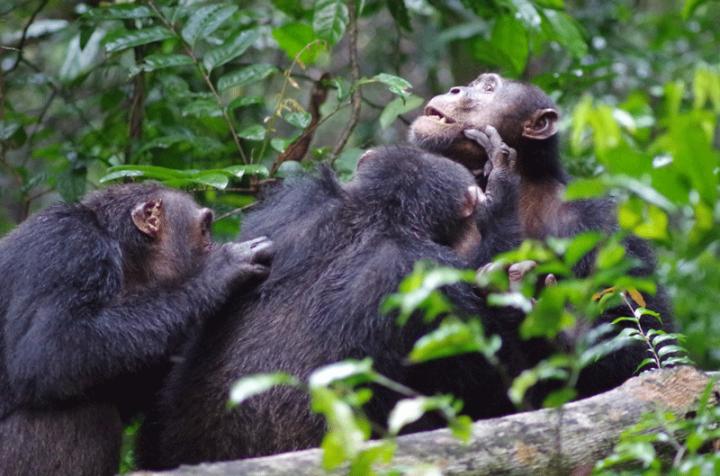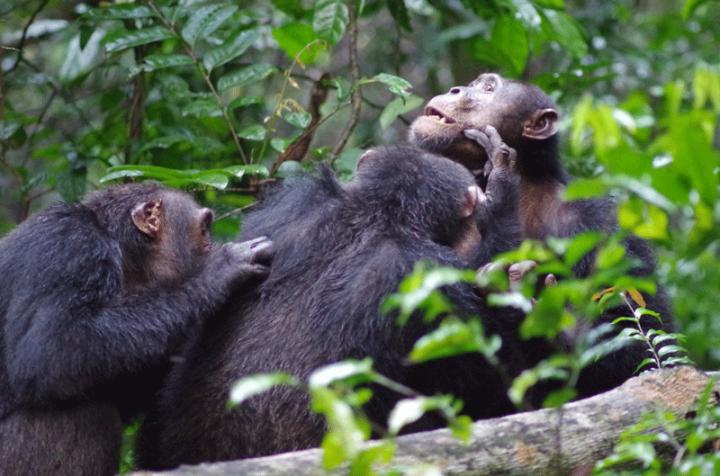
Credit: Roman Wittig, Taï Chimpanzee Project
In humans and other social animals stress is associated with poor health and high mortality. These negative effects can be buffered by receiving social support from relatives or friends. However, the mechanisms responsible for this effect remain largely unknown. A team led by Roman Wittig, Catherine Crockford and Tobias Deschner from the Max Planck Institute for Evolutionary Anthropology in Leipzig, Germany, has studied how wild chimpanzees cope with stressful and non-stressful situations when a close bond partner is present or absent. They measured the animals' urinary stress hormone levels during episodes of intergroup conflict, grooming and resting and found that the support of a friend significantly reduced the chimpanzees' stress hormone levels, especially in situations of conflict. But even during affiliative activities with the bond partner stress levels were generally lower. Daily supportive actions by friends and family maybe key to regulating stress hormone activity, and thus the negative effects of stress, a finding with potential medical implications for humans.
The interaction of the hypothalamus, the pituitary gland and the adrenal glands (HPA axis) regulates the body's response to stress as well as many other processes, including digestion, the immune system, moods and emotions. Stress-induced imbalances of the HPA axis may thus lead to poor physical and mental health. Maintaining close social bonds can, to some degree, help regulate the HPA axis and cushion the effects of stress. "A number of studies in humans and non-human animals show that individuals who maintain close social bonds are often healthier and live longer than the loners amongst them", says Roman Wittig. "The mechanisms facilitating such a relationship, however, remain unclear. If we want to understand how they operate we need to link the hormone level directly to behaviors."
Therefore Wittig and colleagues developed a method to use non-invasive hormone samples from urine to draw conclusions on the reactivity of hormones during single behavioral events. Implementing the event sampling method with one of our closest living relatives, the chimpanzee, the researchers wanted to find out whether friends and family, who by definition provide more predictable support and affiliation than other chimpanzees, help each other cope with stress not only during stressors but in general throughout daily life.
To this aim the researchers observed the behavior of wild chimpanzees living in the Budongo Forest in Uganda during different types of events: stressful and potentially life-threatening intergroup encounters , everyday grooming interactions and periods of resting. The researchers also checked whether chimpanzees' close bond partners had been present or absent during these events. Once one of the events had taken place the researchers collected every possible urine sample for the next six hours and analyzed them to determine the chimpanzees' stress hormone levels.
"We found that within each event, the animals' urinary glucocorticoid levels were lower when engaging with bond partners rather than other individuals, whether during stressful intergroup encounters, everyday affiliative grooming, or resting", says co-author Catherine Crockford. "Bond partner effects, however, were strongest during intergroup encounters, then during grooming and least during resting." Tobias Deschner points out: "This study is especially interesting because we are able to trace the impact of general social patterns such as of maintaining social bonds over time down to single social interactions and their influence on glucocorticoid excretion".
The social support of bond partners, no matter of which sex, is highly beneficial for regulating the HPA axis and maintaining a healthy equilibrium. "In chimpanzees social support from bond partners seems to have more pronounced effects not only on urinary stress hormone levels but also on urinary oxytocin levels, as we have found in other studies", says Wittig. "The neuropeptide oxytocin is thought to facilitate the down-regulation of the HPA axis. Given that oxytocin is associated with affiliative interactions between adult chimpanzee friends, it may be that stress buffering provided by chimpanzee friends in this study may in part be mediated by oxytocin".
The researchers conclude that friends might be even more important for us and our health than we have previously thought – helping us to micro-manage HPA axis activity, a finding with potential medical implications also for humans.
###
Original publication
Roman M. Wittig, Catherine Crockford, Anja Weltring, Kevin E. Langergraber, Tobias Deschner & Klaus Zuberbühler
Social support reduces stress hormone levels in wild chimpanzees across stressful events and everyday affiliations.
Nature Communications; 1 November, 2016 (DOI: 10.1038/NCOMMS13361)
Media Contact
Dr. Roman Wittig
[email protected]
49-341-355-0204
@maxplanckpress
http://www.mpg.de





